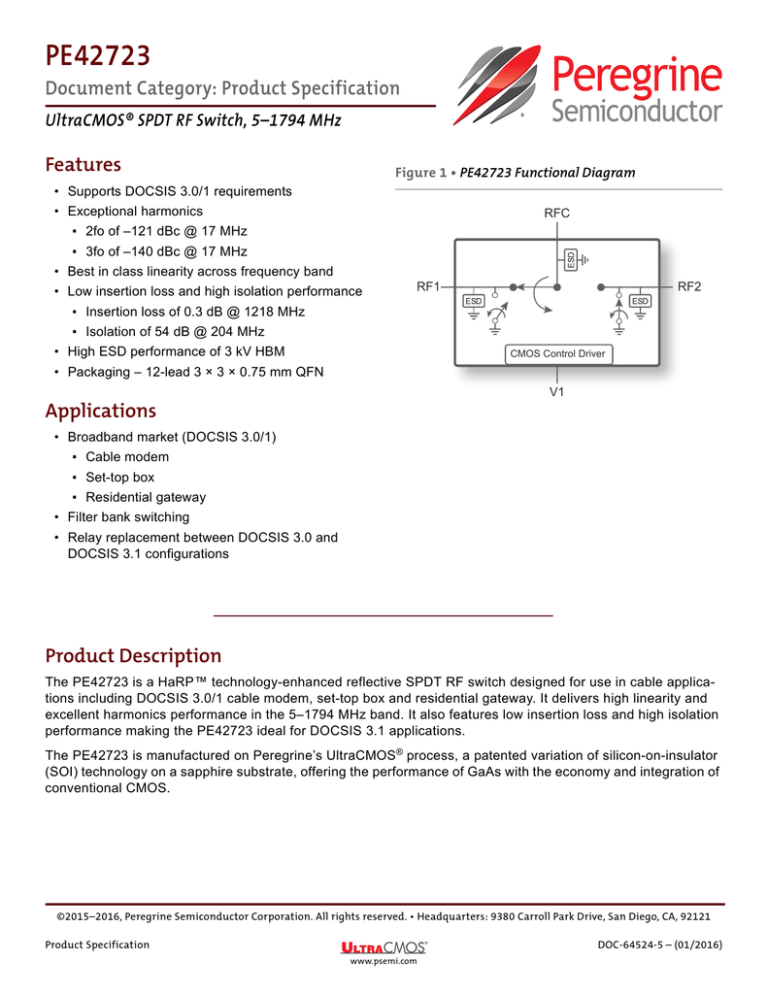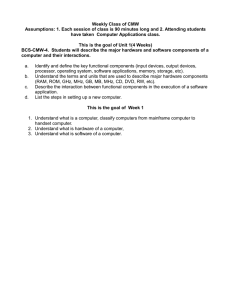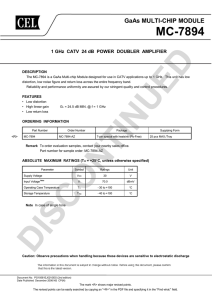
PE42723
Document Category: Product Specification
UltraCMOS® SPDT RF Switch, 5–1794 MHz
Features
Figure 1 • PE42723 Functional Diagram
• Supports DOCSIS 3.0/1 requirements
• Exceptional harmonics
RFC
▪ 2fo of –121 dBc @ 17 MHz
▪ 3fo of –140 dBc @ 17 MHz
• Best in class linearity across frequency band
• Low insertion loss and high isolation performance
RF1
RF2
▪ Insertion loss of 0.3 dB @ 1218 MHz
▪ Isolation of 54 dB @ 204 MHz
• High ESD performance of 3 kV HBM
CMOS Control Driver
• Packaging – 12-lead 3 × 3 × 0.75 mm QFN
V1
Applications
• Broadband market (DOCSIS 3.0/1)
▪ Cable modem
▪ Set-top box
▪ Residential gateway
• Filter bank switching
• Relay replacement between DOCSIS 3.0 and
DOCSIS 3.1 configurations
Product Description
The PE42723 is a HaRP™ technology-enhanced reflective SPDT RF switch designed for use in cable applications including DOCSIS 3.0/1 cable modem, set-top box and residential gateway. It delivers high linearity and
excellent harmonics performance in the 5–1794 MHz band. It also features low insertion loss and high isolation
performance making the PE42723 ideal for DOCSIS 3.1 applications.
The PE42723 is manufactured on Peregrine’s UltraCMOS® process, a patented variation of silicon-on-insulator
(SOI) technology on a sapphire substrate, offering the performance of GaAs with the economy and integration of
conventional CMOS.
©2015–2016, Peregrine Semiconductor Corporation. All rights reserved. • Headquarters: 9380 Carroll Park Drive, San Diego, CA, 92121
Product Specification
DOC-64524-5 – (01/2016)
www.psemi.com
PE42723
SPDT RF Switch
Absolute Maximum Ratings
Exceeding absolute maximum ratings listed in Table 1 may cause permanent damage. Operation should be
restricted to the limits in Table 2. Operation between operating range maximum and absolute maximum for
extended periods may reduce reliability.
ESD Precautions
When handling this UltraCMOS device, observe the same precautions as with any other ESD-sensitive devices.
Although this device contains circuitry to protect it from damage due to ESD, precautions should be taken to
avoid exceeding the rating specified in Table 1.
Latch-up Immunity
Unlike conventional CMOS devices, UltraCMOS devices are immune to latch-up.
Table 1 • Absolute Maximum Ratings for PE42723
Parameter/Condition
Min
Max
Unit
Supply voltage, VDD
–0.3
5.5
V
Digital input voltage, V1
–0.3
3.6
V
86
dBmV
+150
°C
ESD voltage HBM(1), all pins
3000
V
ESD voltage CDM(2), all pins
500
V
RF input power, 75Ω
Storage temperature range
–65
Notes:
1) Human body model (MIL-STD 883 Method 3015).
2) Charged device model (JEDEC JESD22-C101).
Page 2
DOC-64524-5 – (01/2016)
www.psemi.com
PE42723
SPDT RF Switch
Recommended Operating Conditions
Table 2 lists the recommended operating conditions for the PE42723. Devices should not be operated outside
the operating conditions listed below.
Table 2 • Recommended Operating Conditions for PE42723
Parameter
Supply voltage, VDD
Min
Typ
Max
Unit
2.3
3.3
5.5
V
130
200
µA
Supply current, IDD
Digital input high, V1
1.17
3.6(1)
V
Digital input low, V1
–0.3
0.6
V
RF input power, CW(2)
80
dBmV
RF input power, peak(3)
85
dBmV
+85
°C
Operating temperature range
–40
+25
Notes:
1) Maximum digital input voltage is limited to VDD and cannot exceed 3.6V.
2) 100% duty cycle, 75Ω.
3) OFDMA DOCSIS 3.1, single channel, 75Ω.
DOC-64524-5 – (01/2016)
Page 3
www.psemi.com
PE42723
SPDT RF Switch
Electrical Specifications
Table 3 provides the PE42723 key electrical specifications @ +25 °C, VDD = 3.3V, ZS = ZL = 75Ω, unless
otherwise specified.
Table 3 • PE42723 Electrical Specifications
Parameter
Path
Condition
Operating frequency
Insertion loss(1)
Isolation
Return loss(1)
2nd harmonic, 2fo
3rd harmonic, 3fo
Input 0.1dB compression
point(2)
Switching time
Min
Typ
5
Unit
1794
MHz
0.20
0.45
dB
dB
dB
RFC–RFX
5–204 MHz
204–1218 MHz
1218–1794 MHz
All paths
5–204 MHz
204–612 MHz
612–1218 MHz
1218–1794 MHz
50
40
36
54
44
38
34
dB
dB
dB
dB
RFC–RFX
5–204 MHz
204–612 MHz
612–1218 MHz
1218–1794 MHz
25
18
30
22
14
13
dB
dB
dB
dB
fo = 17 MHz
Average PCW = 65 dBmV
–121
dBc
fo = 170 MHz
Average PCW = 65 dBmV
–121
dBc
fo = 900 MHz
Average PCW = 65 dBmV
–121
dBc
fo = 17 MHz
Average PCW = 65 dBmV
–140
dBc
fo = 170 MHz
Average PCW = 65 dBmV
–132
dBc
fo = 900 MHz
Average PCW = 65 dBmV
–135
dBc
5–1218 MHz
87
dBmV
50% CTRL to 90% or 10% RF
35
µs
RFX
RFX
RFC–RFX
0.10
0.30
0.40
Max
Notes:
1) High frequency performance can be improved by external matching (see Figure 12–Figure 15).
2) The input 0.1dB compression point is a linearity figure of merit. Refer to Table 2 for the operating RF input power (75Ω).
Page 4
DOC-64524-5 – (01/2016)
www.psemi.com
PE42723
SPDT RF Switch
Switching Frequency
Control Logic
The PE42723 has a maximum 10 kHz switching
frequency. Switching frequency describes the time
duration between switching events. Switching time is
the time duration between the point the control signal
reached 50% of the final value and the point the
output signal reaches within 10% or 90% of its target
value.
Table 5 provides the control logic truth table for the
PE42723.
Table 5 • Truth Table for PE42723
Spurious Performance
State
V1
RFC–RF1
H
RFC–RF2
L
The PE42723 spur fundamental occurs around 10
MHz. Its typical performance is –154 dBm/Hz (V1 = H)
and –165 dBm/Hz (V1 = L), with 100 kHz bandwidth.
Thermal Data
Psi-JT (JT), junction top-of-package, is a thermal
metric to estimate junction temperature of a device on
the customer application PCB (JEDEC JESD51-2).
JT = (TJ – TT)/P
where
JT = junction-to-top of package characterization
parameter, °C/W
TJ = die junction temperature, °C
TT = package temperature (top surface, in the
center), °C
P = power dissipated by device, Watts
Table 4 • Thermal Data for PE42723
Parameter
Maximum junction temperature, TJMAX
(RF input power, CW = 80 dBmV, +85°C ambient)
JT
Typ Unit
90
°C
21
°C/W
DOC-64524-5 – (01/2016)
Page 5
www.psemi.com
PE42723
SPDT RF Switch
Typical Performance Data
Figure 2–Figure 11 show the typical performance data @ +25 °C, VDD = 3.3V, ZS = ZL = 75Ω, unless otherwise
specified.
Figure 2 • Insertion Loss vs Temperature (RFC–RFX)(*)
−40 ºC
+25 ºC
+85 ºC
0
Insertion Loss (dB)
−0.5
−1
−1.5
−2
−2.5
−3
−3.5
−4
0
0.2
0.4
0.6
0.8
1
1.2
1.4
1.6
1.8
2
1.6
1.8
2
Frequency (GHz)
Note: * High frequency performance can be improved by external matching (see Figure 12–Figure 15).
Figure 3 • Insertion Loss vs VDD (RFC–RFX)(*)
2.3V
3.3V
5.5V
0
Insertion Loss (dB)
−0.5
−1
−1.5
−2
−2.5
−3
−3.5
−4
0
0.2
0.4
0.6
0.8
1
1.2
1.4
Frequency (GHz)
Note: * High frequency performance can be improved by external matching (see Figure 12–Figure 15).
Page 6
DOC-64524-5 – (01/2016)
www.psemi.com
PE42723
SPDT RF Switch
Figure 4 • RFC Port Return Loss vs Temperature(*)
−40 ºC
+25 ºC
+85 ºC
0
−5
Return Loss (dB)
−10
−15
−20
−25
−30
−35
−40
−45
−50
0
0.2
0.4
0.6
0.8
1
1.2
1.4
1.6
1.8
2
1.6
1.8
2
Frequency (GHz)
Note: * High frequency performance can be improved by external matching (see Figure 12–Figure 15).
Figure 5 • RFC Port Return Loss vs VDD(*)
2.3V
3.3V
5.5V
0
−5
Return Loss (dB)
−10
−15
−20
−25
−30
−35
−40
−45
−50
0
0.2
0.4
0.6
0.8
1
1.2
1.4
Frequency (GHz)
Note: * High frequency performance can be improved by external matching (see Figure 12–Figure 15).
DOC-64524-5 – (01/2016)
Page 7
www.psemi.com
PE42723
SPDT RF Switch
Figure 6 • Active Port Return Loss vs Temperature(*)
−40 ºC
+25 ºC
+85 ºC
0
−5
Return Loss (dB)
−10
−15
−20
−25
−30
−35
−40
−45
−50
0
0.2
0.4
0.6
0.8
1
1.2
1.4
1.6
1.8
2
1.6
1.8
2
Frequency (GHz)
Note: * High frequency performance can be improved by external matching (see Figure 12–Figure 15).
Figure 7 • Active Port Return Loss vs VDD(*)
2.3V
3.3V
5.5V
0
−5
Return Loss (dB)
−10
−15
−20
−25
−30
−35
−40
−45
−50
0
0.2
0.4
0.6
0.8
1
1.2
1.4
Frequency (GHz)
Note: * High frequency performance can be improved by external matching (see Figure 12–Figure 15).
Page 8
DOC-64524-5 – (01/2016)
www.psemi.com
PE42723
SPDT RF Switch
Figure 8 • Isolation vs Temperature (RFX–RFX)
−40 ºC
+25 ºC
+85 ºC
0
−10
Isolation (dB)
−20
−30
−40
−50
−60
−70
−80
−90
0
0.2
0.4
0.6
0.8
1
1.2
1.4
1.6
1.8
2
1.6
1.8
2
Frequency (GHz)
Figure 9 • Isolation vs VDD (RFX–RFX)
2.3V
3.3V
5.5V
0
−10
Isolation (dB)
−20
−30
−40
−50
−60
−70
−80
−90
0
0.2
0.4
0.6
0.8
1
1.2
1.4
Frequency (GHz)
DOC-64524-5 – (01/2016)
Page 9
www.psemi.com
PE42723
SPDT RF Switch
Figure 10 • Isolation vs Temperature (RFC–RFX)
−40 ºC
+25 ºC
+85 ºC
0
−10
Isolation (dB)
−20
−30
−40
−50
−60
−70
−80
−90
0
0.2
0.4
0.6
0.8
1
1.2
1.4
1.6
1.8
2
1.6
1.8
2
Frequency (GHz)
Figure 11 • Isolation vs VDD (RFC–RFX)
2.3V
3.3V
5.5V
0
−10
Isolation (dB)
−20
−30
−40
−50
−60
−70
−80
−90
0
0.2
0.4
0.6
0.8
1
1.2
1.4
Frequency (GHz)
Page 10
DOC-64524-5 – (01/2016)
www.psemi.com
PE42723
SPDT RF Switch
High Frequency Performance with External Matching
High frequency insertion loss and return loss can be improved by inductive matching on the RF ports in the
customer application board layout. Figure 12 is a matching network using a 2.2 nH inductor on each RF port.
The inductor needs to be placed as close to the device under test (DUT) as possible. Figure 13–Figure 15
show the insertion loss and return loss improvement using a 2.2 nH inductor on RFC port and a 2.2 nH on RF1,
RF2 and RFC ports, respectively.
Figure 12 • PE42723 Matching Network
DUT
L = 2.2 nH
L = 2.2 nH
SPDT
PE42723
RF1
RF2
L = 2.2 nH
RFC
Figure 13 • Insertion Loss (RFC–RFX) With or Without Matching(*)
No Matching
RFC Matched Only
All RF Ports Matched
0
Insertion Loss (dB)
-0.1
-0.2
-0.3
-0.4
-0.5
-0.6
-0.7
-0.8
-0.9
-1
0
0.2
0.4
0.6
0.8
1
1.2
1.4
1.6
1.8
2
Frequency (GHz)
Note: * For reference only.
DOC-64524-5 – (01/2016)
Page 11
www.psemi.com
PE42723
SPDT RF Switch
Figure 14 • RFC Port Return Loss With or Without Matching(*)
No Matching
RFC Matched Only
All RF Ports Matched
0
Return Loss (dB)
-5
-10
-15
-20
-25
-30
-35
-40
-45
-50
0
0.2
0.4
0.6
0.8
1
1.2
1.4
1.6
1.8
2
Frequency (GHz)
Note: * For reference only.
Figure 15 • Active Port Return Loss With or Without Matching(*)
No Matching
RFC Matched Only
All RF Ports Matched
0
Return Loss (dB)
-5
-10
-15
-20
-25
-30
-35
-40
-45
-50
0
0.2
0.4
0.6
0.8
1
1.2
1.4
1.6
1.8
2
Frequency (GHz)
Note: * For reference only.
Page 12
DOC-64524-5 – (01/2016)
www.psemi.com
PE42723
SPDT RF Switch
Evaluation Kit
The PE42723 evaluation board was designed to ease customer evaluation of the PE42723 RF switch. The RF
common port is connected through a 75Ω transmission line via the F-Type connector, J3. RF1 and RF2 ports are
connected through 75Ω transmission lines via F-Type connectors J1 and J2, respectively. A 75Ω through transmission line is available via F-Type connectors J4 (THRU left) and J5 (THRU right), which can be used to deembed the loss of the PCB. J6 provides DC and digital inputs to the device.
Figure 16 • Evaluation Kit Layout for PE42723
DOC-64524-5 – (01/2016)
Page 13
www.psemi.com
PE42723
SPDT RF Switch
Pin Information
Table 6 • Pin Descriptions for PE42723
This section provides pinout information for the
PE42723. Figure 17 shows the pin map of this device
for the available package. Table 6 provides a
description for each pin.
1, 3, 7, 9,
10, 12
GND
Ground
2
RF1(*)
RF port 1
4
NC
Do not connect
5
VDD
Supply voltage (nominal 3.3V)
6
V1
Digital control logic input 1
8
RF2(*)
RF port 2
11
RFC(*)
RF common
Pad
GND
GND
Pin
Name
10
6
3
V1
GND
Exposed
Ground Pad
5
2
VDD
RF1
4
1
NC
GND
11
12
GND
Pin 1 Dot
Marking
RFC
Figure 17 • Pin Configuration (Top View)
Pin No.
9
GND
8
RF2
7
GND
Description
Exposed pad: ground for proper operation
Note: * RF pins 2, 8 and 11 must be at 0 VDC. The RF pins do not
require DC blocking capacitors for proper operation if the 0 VDC requirement is met.
Page 14
DOC-64524-5 – (01/2016)
www.psemi.com
PE42723
SPDT RF Switch
Packaging Information
This section provides packaging data including the moisture sensitivity level, package drawing, package
marking and tape-and-reel information.
Moisture Sensitivity Level
The moisture sensitivity level rating for the PE42723 in the 12-lead 3 × 3 × 0.75 mm QFN package is MSL1.
Package Drawing
Figure 18 • Package Mechanical Drawing for 12-lead 3 × 3 × 0.75 mm QFN
0.10 C
A
PIN #1 CORNER
3.00
0.50
(x8)
(2X)
B
0.40±0.05
(x12)
0.85
(x12)
1
9
10
12
12
10
1
9
1.65
1.60±0.05
3.00
7
3
0.25
(x12)
0.10 C
(2X)
4
6
BOTTOM VIEW
0.10 C
0.75±0.05
0.05 C
0.10
0.05
1.65
2.90
Ref.
SIDE VIEW
0.05
MAX
RECOMMENDED LAND PATTERN
C A B
C
ALL FEATURES
SEATING PLANE
6
4
1.60±0.05
TOP VIEW
2.90
Ref.
3
7
0.23±0.05
(x12)
0.20
0.50
(x8)
C
Third Angle
Projection
Unless otherwise specified
dimensions are in millimeters
DECIMAL
ANGULAR
X.X ± 0.1
± 1°
X.XX ± 0.05
X.XXX ± 0.030
Interpret dimensions and tolerance
per ASME Y14.5 – 1994
DOC-64524-5 – (01/2016)
Page 15
www.psemi.com
PE42723
SPDT RF Switch
Top-Marking Specification
Figure 19 • Package Marking Specifications for PE42723
42723
YYWW
ZZZZZZ
=
YY =
WW =
ZZZZZZ =
Pin 1 indicator
Last two digits of assembly year
Assembly work week
Assembly lot code (maximum six characters)
Tape and Reel Specification
Figure 20 • Tape and Reel Specifications for 12-lead 3 × 3 × 0.75 mm QFN
Direction of Feed
Section A-A
P1
P0
see
note 1
T
P2
see note 3
D1
D0
A
E
F
see note 3
B0
A0
K0
A
W0
Notes:
A0
B0
K0
D0
D1
E
F
P0
P1
P2
T
W0
3.30
3.30
1.10
1.50 + 0.1/ -0.0
1.5 min
1.75 ± 0.10
5.50 ± 0.05
4.00
8.00
2.00 ± 0.05
0.30 ± 0.05
12.00 ± 0.3
1. 10 Sprocket hole pitch cumulative tolerance ±0.2
2. Camber in compliance with EIA 481
3. Pocket position relative to sprocket hole measured
as true position of pocket, not pocket hole
Pin 1
Device Orientation in Tape
Page 16
DOC-64524-5 – (01/2016)
www.psemi.com
PE42723
SPDT RF Switch
Ordering Information
Table 7 lists the available ordering codes for the PE42723 as well as available shipping methods.
Table 7 • Order Codes for PE42723
Order Codes
Description
Packaging
Shipping Method
PE42723A-Z
PE42723 SPDT RF switch
12-lead 3 × 3 × 0.75 mm QFN
3000 units/T&R
EK42723-01
PE42723 Evaluation kit
Evaluation kit
1/Box
Document Categories
Advance Information
Product Brief
The product is in a formative or design stage. The datasheet contains
design target specifications for product development. Specifications
and features may change in any manner without notice.
This document contains a shortened version of the datasheet. For the
full datasheet, contact sales@psemi.com.
Preliminary Specification
Not Recommended for New Designs (NRND)
This product is in production but is not recommended for new designs.
The datasheet contains preliminary data. Additional data may be added
at a later date. Peregrine reserves the right to change specifications at
any time without notice in order to supply the best possible product.
Product Specification
The datasheet contains final data. In the event Peregrine decides to
change the specifications, Peregrine will notify customers of the
intended changes by issuing a CNF (Customer Notification Form).
End of Life (EOL)
This product is currently going through the EOL process. It has a
specific last-time buy date.
Obsolete
This product is discontinued. Orders are no longer accepted for this
product.
Sales Contact
For additional information, contact Sales at sales@psemi.com.
Disclaimers
The information in this document is believed to be reliable. However, Peregrine assumes no liability for the use of this information. Use shall be
entirely at the user’s own risk. No patent rights or licenses to any circuits described in this document are implied or granted to any third party.
Peregrine’s products are not designed or intended for use in devices or systems intended for surgical implant, or in other applications intended to
support or sustain life, or in any application in which the failure of the Peregrine product could create a situation in which personal injury or death
might occur. Peregrine assumes no liability for damages, including consequential or incidental damages, arising out of the use of its products in
such applications.
Patent Statement
Peregrine products are protected under one or more of the following U.S. patents: patents.psemi.com
Copyright and Trademark
©2015–2016, Peregrine Semiconductor Corporation. All rights reserved. The Peregrine name, logo, UTSi and UltraCMOS are registered trademarks and HaRP, MultiSwitch and DuNE are trademarks of Peregrine Semiconductor Corp.
Product Specification
www.psemi.com
DOC-64524-5 – (01/2016)


